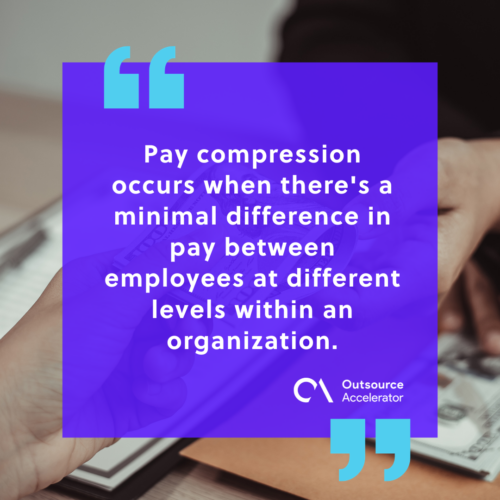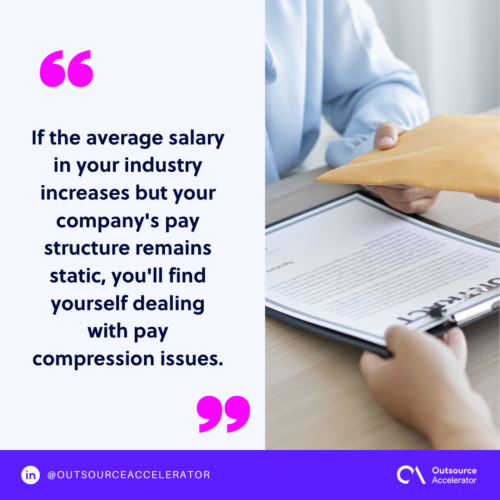Understanding pay compression and its preventative measures

The term “pay compression” has been making waves in businesses. But why exactly is it causing concern?
If you’re involved in any aspect of compensation, this is a topic you can’t afford to overlook.
In this article, we’ll explore the ins and outs of pay compression, its root causes, and, most importantly, how to prevent it.
What is pay compression?
Pay compression occurs when there’s a minimal difference in pay between employees at different levels within an organization.
Picture this: you have long-time, loyal employees who have been with the company for years, and their salaries are nearly on par with new hires.
This creates a situation where experience and loyalty are undervalued, leading to dissatisfaction among seasoned staff.

Why is pay compression an issue?
Pay compression is an issue for several reasons, primarily in the context of organizations and the labor market. It can impact various aspects within a company, and it’s essential to understand why it’s a concern.
Here’s why it is considered a dilemma:
Employee morale
When employees who have devoted years to a company find out that their pay is almost identical to someone who just walked in the door, it’s demoralizing.
After all, they expect their loyalty and experience to be rewarded. When this doesn’t happen, morale takes a fall, and a demotivated workforce is never good for business.
Retention problems
Imagine constantly losing your most seasoned employees because they feel undervalued and underpaid. This is a significant issue associated with pay compression.
Retaining talent is a challenge when your pay structure doesn’t adequately reward experience and expertise.
Recruitment challenges
On the flip side, attracting new talent can be equally challenging.
When potential hires see minimal pay difference between entry-level and senior positions, they might be discouraged from joining your organization.
Pay compression can make competing for top talent in the job market tough.
Causes of pay compression
Pay compression doesn’t just happen overnight. It often stems from various factors that slowly creep into an organization’s compensation structure.
Some common causes of pay compression include:
Market changes
Market changes can impact pay compression. If the average salary in your industry increases but your company’s pay structure remains static, you’ll find yourself dealing with pay compression issues.

Salary freezes
During tough economic times, companies might freeze salaries to cut costs.
While this can be necessary, it can also contribute to pay compression as newer employees remain on the norm with their experienced peers.
Uniform raises
Some organizations give uniform raises to all employees, regardless of their experience or performance. While this may seem fair, it can create pay compression over time.
Inadequate pay structures
Poorly designed pay structures that don’t account for experience and skill levels can be a breeding ground for pay compression.
When there’s no clear distinction between pay levels, compression is inevitable.
Inflation
Inflation destroys the value of money over time. Pay compression can occur as real wages decrease if salaries don’t keep pace with inflation.
Solutions to preventing pay compression
Preventing pay compression requires a thoughtful and proactive approach to compensation management within an organization.
Here are some effective strategies to keep it at bay:
Regular compensation reviews
Regularly reviewing your compensation structure is crucial. This allows you to make necessary adjustments to reward experienced employees appropriately.
Market research
Stay informed about industry salary trends. Conduct market research to ensure your salaries are competitive and attractive to both current and potential employees.
Performance-based pay
Implementing a performance-based pay system can be a game-changer. Rewarding employees based on their skills, experience, and achievements can help alleviate pay compression issues.
New hire salary guidelines
Set clear guidelines for new hires. Ensure that their starting salaries are competitive, but also differentiate them from more experienced employees to avoid compression.
Salary range adjustments
Regularly adjust salary ranges to account for inflation and market changes. This helps maintain a fair and competitive pay structure.
Addressing pay compression in the future
Preventing pay compression is an ongoing process that requires a combination of:
- Vigilance
- Market awareness
- Commitment to fair compensation practices
Companies proactively addressing pay compression can maintain a motivated and loyal workforce, attract top talent, and ensure their long-term success.
Dealing with pay compression is not an option – it’s a necessity.
It impacts employee morale, retention, and recruitment, making it a critical concern for businesses and HR professionals.
Businesses must understand the causes of pay compression and implement effective solutions. Doing so enables them to maintain a fair and competitive compensation structure that benefits both employees and the organization.







 Independent
Independent




